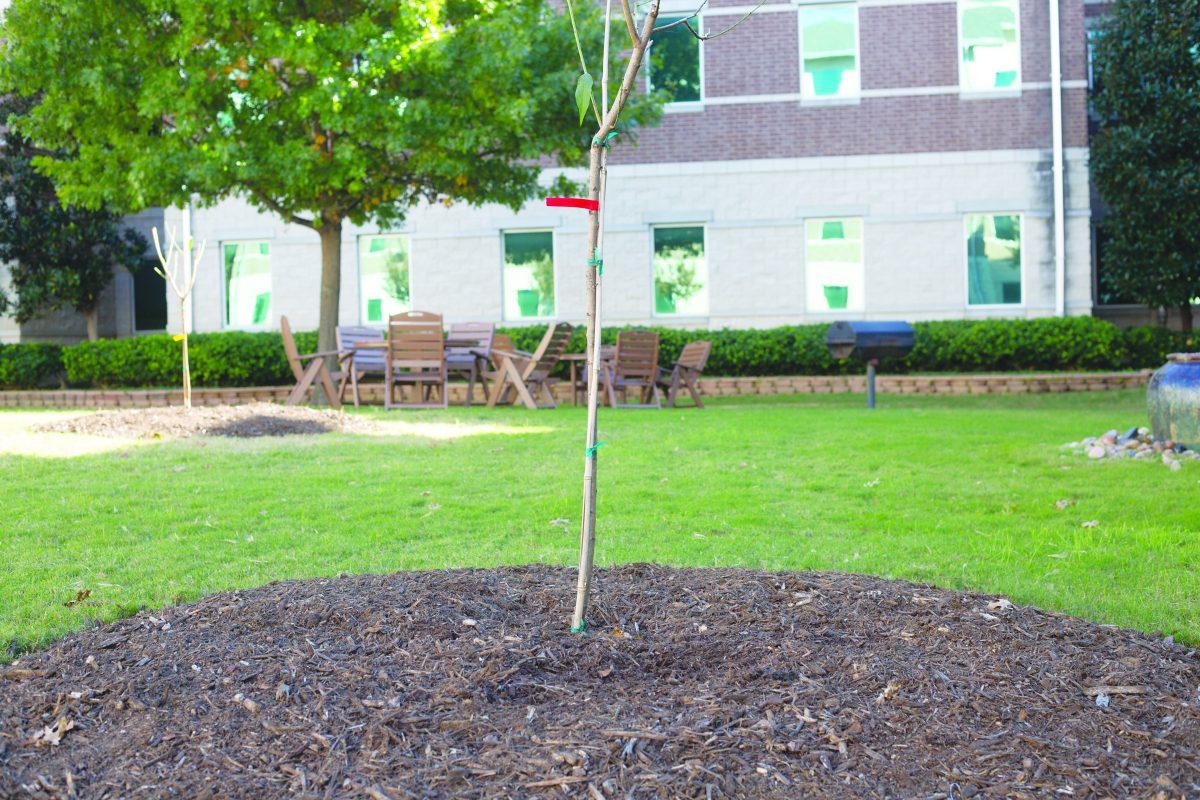In recognition of Texas Arbor Day, Facilities Management worked with the Office of Student Volunteerism to plant fruit trees in residence hall courtyards.
Gary Cocke, the associate director of energy conservation and sustainability, said the idea for planting fruit trees began as a discussion between himself and the associate director for facilities services, Sam Eike.
“We’re certified through the Arbor Day Foundation as a Tree Campus USA, and every year we do an event where we plant trees in recognition and observance of Texas Arbor Day,” Cocke said. “And so, we were thinking about what it would be this year, and we thought, ‘Wouldn’t it be great if we had fruit trees where students could grab a peach or a plum as they go to and from classes?’”
According to the Arbor Day Foundation website, qualifying for Tree Campus USA status requires a university to meet five standards related to cultivating trees and engaging students, one of which is an annual expenditure toward planting or caring for trees. This year’s tree planting was part of the Office of Student Volunteerism’s Viva Volunteer day — UTD’s largest single day of service — with over 30 students taking part in the fruit tree event alone. Although Viva Volunteer day was Oct. 27, one week before Texas Arbor Day, the OSV and Facilities Management cooperated to make the events coincide. Aaron Koehler, a program coordinator for the OSV, said students would not only plant trees, but learn about the different types of fruit trees, the benefits of having a tree campus and UTD’s effort in Tree Campus USA.
“We thought that it would maybe be best this year to combine our efforts in recognizing Texas Arbor Day while also celebrating Viva and giving an opportunity for a larger group of students to band together under the National Make-A-Difference Day and put their roots down on campus with fruit trees,” Koehler said.
In total, 27 fruit trees were planted in the courtyards of residence halls — seven in Residence Halls North, Northwest and Southwest, and six in Residence Hall South because of space restrictions. Cocke said though the fruit trees will be low-maintenance once well-established, student workers in the Office of Sustainability will ensure that the trees remain watered and maintained during their initial growth.
“We should be producing fruit in three to four years,” Cocke said. “I hope that we have freshmen that come for the planting, and they’ll be able to enjoy it when they’re a senior. Or, otherwise, hopefully they will come back as alumni and be able to get the fruits of their labors, literally.”
Despite the fact that the peaches and plums won’t be ready for several years, cognitive science senior Jennifer Good, the president of the UTD Sustainability Club, said the trees will have multiple benefits.
“I think, just in general, adding any trees or plants or flowers or anything adds more awareness to sustainability,” she said. “I feel like everyone has an experience where they have like, ‘Oh, I like that tree growing up,’ and then they want to garden in the future. So, it could be a stimulus for people to get involved with gardening or stuff like that later.”
Koehler said the trees will improve the aesthetics of the campus.
“I think that any time that you can add any sort of plant or tree to any space, that’s obviously going to give it a nice little facelift,” he said. “A greener campus is a happier campus.”
In the future, students hoping to volunteer in environment-friendly events can look forward to annual tree-planting events, helping in the community garden and participating in the OSV’s Earth Week during the second or third week of April. To further engage students in sustainability initiatives, the Office of Sustainability recently launched a program called Global Citizen Sustainability Service Honors.
“The goal of (the program) is to engage students in volunteerism related to sustainability, and when students meet the hours requirement, then they can receive an honor at graduation,” Cocke said. “Everybody has a role to play with sustainability, and so it’s just a matter of integrating sustainability principles into what you’re already interested in.”
Students interested in participating in Global Citizen Sustainability Service Honors should contact the Office of Sustainability for more information. In the end, however, Koehler said bringing together people with diverse backgrounds and skillsets is how volunteering in the environment creates a ripple effect.
“With environmental conservation, I think it’s really important that not only are we volunteering and helping to give back to our fellow human, but ultimately, in order to lead better and more fulfilled lives, we have to give back to the Earth,” Koehler said.







